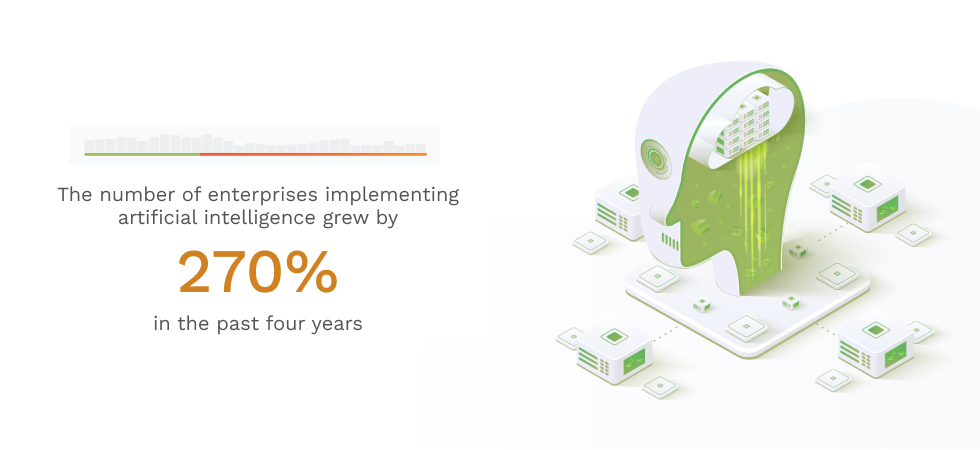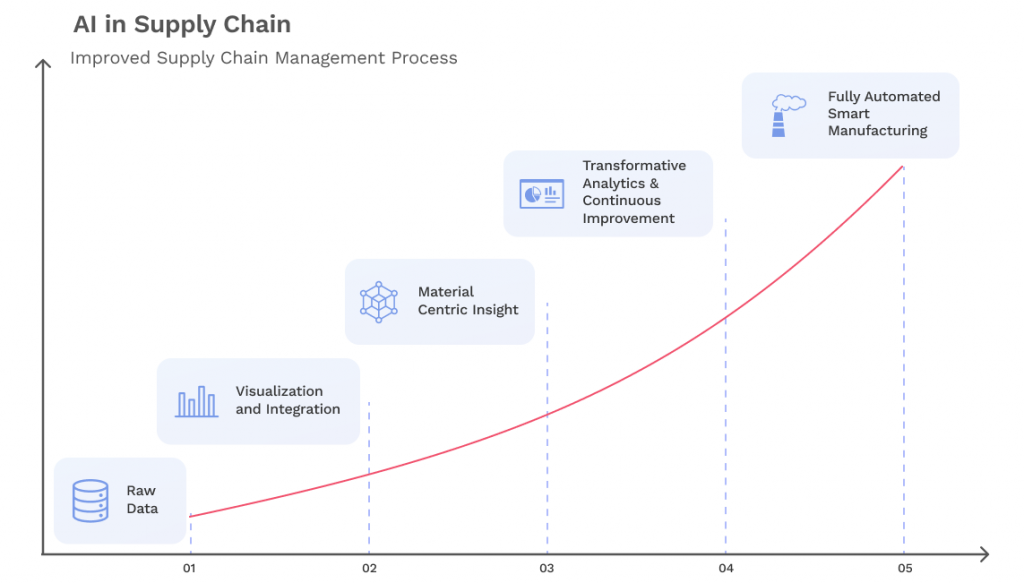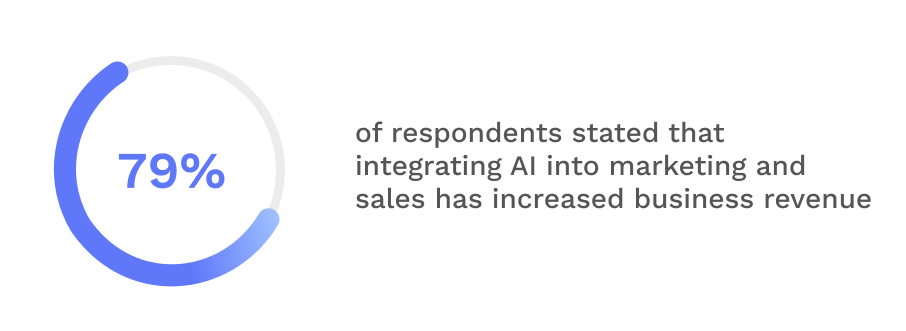How AI Is Becoming the Engine of B2B eCommerce
How AI Is Becoming the Engine of B2B eCommerce
AI in B2B eCommerce is no longer a futuristic concept–it’s a reality that’s transforming the way businesses operate, interact with clients, and drive growth.
The power of artificial intelligence lies in its ability to automate and perfect the completion of mundane tasks that were traditionally time-consuming and prone to human error. From managing inventory and forecasting demand to personalizing client experiences and optimizing pricing strategies, AI is taking over a multitude of operational aspects in B2B eCommerce.
In this blog post, we discuss the role of AI in B2B eCommerce and explore how it’s driving operational excellence and contributing to business growth. We also look at various use cases of AI, highlighting its impact on different aspects of B2B eCommerce and the benefits it brings to the table.
Quick Takeaways
- The number of businesses adopting AI has grown by 270% in the past 4 years.
- AI helps businesses optimize pricing and inventory management, leading to more informed decisions, improved efficiency, and increased profitability.
- Recent data shows that AI inventory solutions can improve inventory accuracy by up to 95%.
- AI in B2B eCommerce enables businesses to identify more cost-effective and efficient opportunities, leading to significant cost savings and higher customer satisfaction.
The Role of AI in B2B eCommerce
In the quickly evolving digital landscape, generative Artificial Intelligence (GenAI) has emerged as a major player, particularly in the realm of B2B eCommerce.
According to Gartner, the number of businesses adopting AI has grown by 270% in the past 4 years.

This is because AI’s ability to analyze vast amounts of data, identify patterns, and make predictions makes it an invaluable tool for businesses looking to optimize and streamline their processes and operations.
For example, think about the position of a wholesale distributor of office supplies. In the past, the distributor might have relied on manual processes and gut instinct to determine pricing and manage inventory.
However, this approach can lead to inefficiencies and missed opportunities. If the price point of a popular item is set too low, the distributor could be leaving money on the table. On the other hand, if the price is set too high, the item might not sell, leading to excess inventory.
AI can help the distributor set optimal prices that maximize profit while ensuring a steady flow of sales by analyzing:
- Historical sales data
- Current market trends
- Competitor pricing
AI can also predict future demand for different items, helping the distributor manage inventory more effectively and avoid both stockouts and overstock situations. In fact, recent data shows that AI inventory solutions can improve inventory accuracy by up to 95%.
In B2B commerce, AI helps businesses optimize pricing and inventory management, among other many things, including:
- Making more informed decisions
- Improving efficiency and saving time
- Increasing profitability

AI and Commerce Logistics
Logistics is a critical component that directly impacts:
- Customer satisfaction
- Operational efficiency
- The bottom line
The traditional approach to managing logistics–relying on manual processes and intuition–is no longer sufficient in today’s fast-paced, data-driven environment. AI is revolutionizing commerce logistics in terms of efficiency and cost.
For example, imagine you are a manufacturer of industrial equipment selling your products to businesses across the globe. Managing logistics in this scenario involves several complex tasks, including:
- Inventory management
- Demand forecasting
- Route optimization

With generative AI insights at your disposal, you can accurately forecast demand for your products. This would allow you to maintain optimal inventory levels–enough to meet demand but not so much that you have capital tied up in unsold goods.
AI can also identify the most cost-effective and efficient routes for delivering your products to your customers. This could significantly reduce your logistics costs and ensure timely delivery, leading to higher customer satisfaction.
Use Cases of AI in B2B eCommerce
AI is being used in various ways to enhance business operations and customer experiences. In this section, we explore some of the best use cases.

Supply Chain Management
AI algorithms can analyze data from different stages of the supply chain to identify inefficiencies or bottlenecks. This can help businesses to streamline their operations, reduce costs, and improve delivery times.
AI can also help with supplier selection by analyzing factors such as:
- Cost
- Quality
- Reliability
- Delivery times
This can ensure businesses work with the best suppliers and reduce the risk of supply chain disruptions.
Demand Forecasting
Over $300 billion in annual revenue is lost because of poor inventory management, making accurate demand forecasting essential. AI can analyze historical sales data, market trends, seasonal patterns, and other relevant factors to predict future demand with a high degree of accuracy.
AI can also identify patterns and trends that may not be apparent to human analysts. For example, it might detect a link between certain events (like a trade show or a marketing campaign) and spikes in demand. Businesses can use these insights to plan their activities and ensure they have sufficient stock to meet demand.
Personalized Business Experiences
Personalization is key to building strong relationships with business clients. AI can provide personalized product recommendations and offers by analyzing a client’s:
- Purchase history
- Interaction patterns
- Preferences
This not only enhances the client’s shopping experience but also increases the likelihood of repeat business.
Product Development and B2B Marketing Strategies
By analyzing client feedback and market trends, AI can provide insights into what features or services clients value the most. These insights can guide product development processes and help businesses meet their clients’ needs more effectively.
In terms of marketing, AI can segment clients based on their behavior and preferences. This allows businesses to tailor their marketing campaigns to each segment, improving the effectiveness of their marketing efforts. As a result, 79% of marketers stated that integrating AI into marketing and sales has increased business revenue.

Improved Client Service
Client service is crucial in the B2B sector, and AI is helping to enhance it. AI-powered chatbots can:
- Handle common client queries
- Provide product recommendations
- Assist with orders
This not only improves the client experience, but also allows client service representatives to focus on more complex issues.
Optimize Your Operations with Hypersonix Today
From optimizing pricing and inventory management to revolutionizing logistics, AI in B2B eCommerce is enabling businesses to make more informed decisions, improve efficiency, and increase profitability.
Hypersonix is a profit optimization platform that uses AI-powered tools to help DTC and eCommerce companies excel. Hypersonix’s ProfitGPT inventory management tools can help businesses leverage generative AI and inventory intelligence to make forecasts and provide actionable insights about inventory levels and pricing strategies.
To see how Hypersonix’s AI tools can help boost your eCommerce sales, request a demo today!





